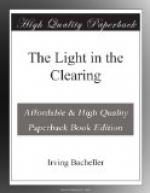After a moment’s pause he went on:
“A man threatened to lick me up to Seaver’s t’other day. You couldn’t blame him. He didn’t know me from a side o’ sole leather. He just thought I was one o’ them common, every-day cusses that folks use to limber up on. But he see his mistake in time. I tell ye God was good to him when he kept him away from me.”
Aunt Deel called us to supper.
“Le’s go in an’ squench our hunger,” Mr. Purvis proposed as he rose and shut his jackknife.
I was very much impressed and called him “Mr. Purvis” after that. I enjoyed and believed many tales of adventure in which he had been the hero as we worked together in the field or stable. I told them to my aunt and uncle one evening, whereupon the latter said:
“He’s a good man to work, but Jerusalem—!”
He stopped. He always stopped at the brink of every such precipice. I had never heard him finish an uncomplimentary sentence.
I began to have doubts regarding the greatness of our hired man. I still called him “Mr. Purvis,” but all my fear of him had vanished.
One day Mr. Grimshaw came out in the field to see my uncle. They walked away to the shade of a tree while “Mr. Purvis” and I went on with the hoeing. I could hear the harsh voice of the money-lender speaking in loud and angry tones and presently he went away.
“What’s the rip?” I asked as my uncle returned looking very sober.
“We won’t talk about it now,” he answered.
That look and the fears it inspired ruined my day which had begun with eager plans for doing and learning. In the candle-light of the evening Uncle Peabody said:
“Grimshaw has demanded his mortgage money an’ he wants it in gold coin. We’ll have to git it some way, I dunno how.”
“W’y of all things!” my aunt exclaimed. “How are we goin’ to git all that money—these hard times?—ayes! I’d like to know?”
“Well, I can’t tell ye,” said Uncle Peabody. “I guess he can’t forgive us for savin’ Rodney Barnes.”
“What did he say?” I asked.
“Why, he says we hadn’t no business to hire a man to help us. He says you an’ me ought to do all the work here. He thinks I ought to took you out o’ school long ago.”
“I can stay out o’ school and keep on with my lessons,” I said.
“Not an’ please him. He was mad when he see ye with a book in yer hand out there in the corn-field.”
What were we to do now? I spent the first sad night of my life undoing the plans which had been so dear to me but not so dear as my aunt and uncle. I decided to give all my life and strength to the saving of the farm. I would still try to be great, but not as great as the Senator. Purvis stayed with us through the summer and fall.
After the crops were in we cut and burned great heaps of timber and made black salts of the ashes by leaching water through them and boiling down the lye. We could sell the salts at three dollars and a half a hundred pounds. The three of us working with a team could produce from one hundred and twenty to one hundred and forty pounds a week. Yet we thought it paid—there in Lickitysplit. All over the hills men and women were turning their efforts and strength into these slender streams of money forever flowing toward the mortgagee.




